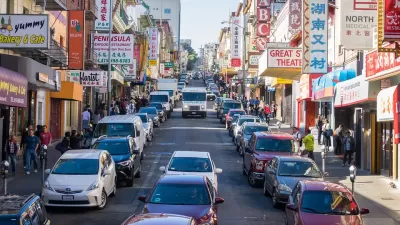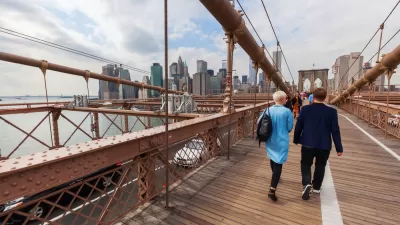An opinion piece by Josh Wilson makes a case for a congestion pricing plan tailored specifically for the realities of living and working in San Francisco.

"Safer streets, less pollution, better transit, bustling business districts — San Francisco can have it all," writes Josh Wilson to open an opinion piece published recently by the San Francisco Chronicle.
But like many other cities around the state and the country, increased amounts of driving and reduced transit ridership are producing congestion, carbon emissions, and air pollution. "Something needs to change, and somebody has to pay," concludes Wilson. "Congestion and zone pricing offer a path forward."
Interestingly, Wilson brackets land use as a means to the solutions sought by congestion pricing by mentioning the political and bureaucratic quagmire of planning and development policy in the city: "One solution is to build around transit rather than automobiles, but that process is bogged down in the eternal battle between preservationists and pro-density developers. We need to raise the stakes while they get their issues sorted out."
A key theme throughout the opinion piece is the specificity of the proposed congestion pricing plan. The proposal targets specific streets, with specific concession made for certain kinds of drivers, and concern for specific outcomes that could be desired less desirable consequences of a congestion pricing scheme.
As noted by Wilson, "touristy Lombard Street and hustling, bustling Market Street" are under consideration as test cases for congestion pricing, following in the footsteps of New York City in implementing a transportation policy previously only encountered in European cities. The Overton window for congestion pricing has also opened in other U.S. cities like Chicago, Seattle, and Los Angeles in recent months.
FULL STORY: San Francisco needs congestion pricing — and not just for downtown driving

Maui's Vacation Rental Debate Turns Ugly
Verbal attacks, misinformation campaigns and fistfights plague a high-stakes debate to convert thousands of vacation rentals into long-term housing.

Planetizen Federal Action Tracker
A weekly monitor of how Trump’s orders and actions are impacting planners and planning in America.

In Urban Planning, AI Prompting Could be the New Design Thinking
Creativity has long been key to great urban design. What if we see AI as our new creative partner?

How Trump's HUD Budget Proposal Would Harm Homelessness Response
Experts say the change to the HUD budget would make it more difficult to identify people who are homeless and connect them with services, and to prevent homelessness.

The Vast Potential of the Right-of-Way
One writer argues that the space between two building faces is the most important element of the built environment.

Florida Seniors Face Rising Homelessness Risk
High housing costs are pushing more seniors, many of them on a fixed income, into homelessness.
Urban Design for Planners 1: Software Tools
This six-course series explores essential urban design concepts using open source software and equips planners with the tools they need to participate fully in the urban design process.
Planning for Universal Design
Learn the tools for implementing Universal Design in planning regulations.
Gallatin County Department of Planning & Community Development
Heyer Gruel & Associates PA
JM Goldson LLC
City of Camden Redevelopment Agency
City of Astoria
Transportation Research & Education Center (TREC) at Portland State University
Jefferson Parish Government
Camden Redevelopment Agency
City of Claremont





























